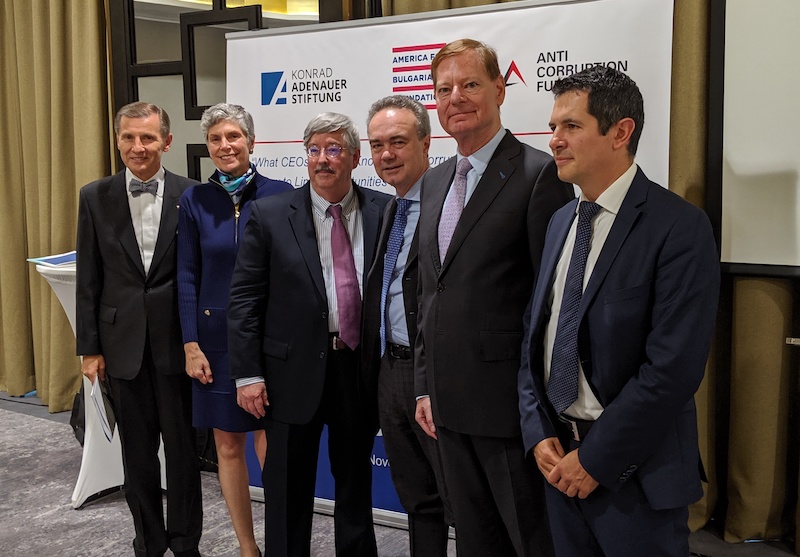
Business executives in the United States know sending someone like John to the corporate battlefield is like sending in the big guns. Usually, a company is about to implode or experience a major shakeup.
John L. Verna, CBA, CPA, CFE, is a battle-hardened integrity warrior with more than 25 years of experience in uncovering financial and other irregularities at Fortune 500 companies and investigating some of the most headline-grabbing cases of corporate malfeasance: the Enron scandal, the Purdue Pharma OxyContin controversy, the bankruptcy of Orange County in California, and many others. He led investigations into high-level perfidy such as economic espionage, gray-market inquiries, and a variety of corporate and public corruption worldwide. A former employer is renowned for exposing Saddam Hussein’s clandestine armament network.
Defeat isn’t what John is after, though. His goal is making companies better corporate citizens as well as better places for their clients, employees, shareholders, vendors. Because corruption hurts us all. “Corruption is corrosive and will eventually destroy what you value the most: your family, your business, your culture, your country,” he said. This is why John is adamant that everyone has a responsibility to “not lie, steal, cheat, or tolerate that behavior in others.” This is how we make our organizations and societies better.
His commitment to business integrity and the fight against corruption led him to establish, in 2014, the Center for Strategic Business Integrity, which helps businesses develop effective corporate oversight strategies and skills.
John spoke about corruption prevention and detection to more than 70 business executives, diplomats, and representatives of trade organizations at an event in Sofia on Tuesday, November 12, organized by the America for Bulgaria Foundation in partnership with the Konrad Adenauer Stiftung Foundation and the Anti-Corruption Fund Foundation (ACF).
“I am very optimistic that every day if you do the right things and you are visible and you lead, you will improve the world,” he said.
In an interview for the ABF newsletter, John discussed the various forms corruption can take, prevention strategies, and personal and corporate responsibility.
What is corruption? And what is its cost?
Corruption in its broadest sense is something very simple: it’s taking something that doesn’t belong to you and hiding the fact that you took it or denying that you took it. That comes in the form of kickbacks for contracts, bribes, pay-for-play. With politicians: “You want me to help you get a contract with the government, then you’ve got to scratch my back.” It comes down to internal executives and managers and employees deciding that you have some extra assets like tools, inventory, or even a car or two. You don’t need them. I am going to take them and sell them for my own benefit. There are all forms of corruption.
If an organization becomes corrupt, it will have multiple forms of corruption take hold over time. Because you have an atmosphere which says, “Yeah, take it for yourself. Grab what you can.” So, you have the senior guys who are cooking the books, the financial statements, in order to get the stock price up so they can cash their options and make a bunch of money even though the financial results are a lie. Then you have maybe some other senior executives say, “If you want my business, if you want me to contract with you to build the next petrochemical plant, no problem. There is a house in Aspen I’d like you to build for me.”
People in the organization aren’t dumb: they sense and see and feel that stuff, and that permeates throughout. So, the shop foreman in the factory says, “They are stealing everything they can. You know, I love that new box of tools that just came in. I’ll take that home and put it in my basement.”
Once an organization starts to become visibly corrupt, then it’s the Wild West, and everybody is just grabbing and taking everything. Corruption in the end will destroy an organization. It may take years to bring it down, but I think eventually they come down.
The problem with studying this sort of thing is that the only thing we really know about corruption is from the people who got caught. We are never going to understand the full scope of corruption because, obviously, they haven’t caught everybody and never will. It’s human nature. It’s an eternal battle.

In your presentation on Tuesday, you talked about instilling an anti-corruption culture? What does this mean, and how do you go about doing this?
Whether you are a government minister or a titan of industry, you do three very simple things.
First, you exhibit visible leadership. It means that a leader or leaders in an organization should not lie, should not cheat, should not steal, and they’d better not tolerate that behavior in anybody who works for them. That’s where it all starts.
Number two, it is the leader’s responsibility to make sure that he has a formal organizational structure that has checks and balances built into it. You want to make sure you segregate the scorekeeping functions like accounting from operations. You don’t want the same people who are in charge of the plant in charge of the scorekeeping of the plant. Because human nature being what it is, one reporting quarter, things may not look so good, they are going to be like, “Oh my god, I am not going to get my bonus. Let’s move this number from column A to column B, to make our profit-and-loss statement look a little better. I will get my bonus this month, and then we’ll be honest next month.” It’s a little more complex to implement in the real world, but that’s the strategic theory and it works.
You’d better make sure every organization has oversight functions. They’ve got external and internal auditors, corporate security, corporate counsel, and the legal compliance functions. You want to make sure that those particular organizations are segregated from operations and scorekeeping, especially for career purposes and performance analysis. You never want the chief financial officer of a company, who the internal auditors are keeping an eye on, to also be in charge of the careers of those internal auditors.
One last structural issue is: you want to make sure that the oversight functions are coordinated. One guy may see a sign, a red flag, over here, another oversight function may recognize a red flag over here, and the two are sort of meaningless, immaterial, nothing to worry about, but if you put the two together, you suddenly find you have a major problem.
The third element is the people element. Below the leader, you have to have a team of people of like mind who all operate under the philosophy of “I will not lie, I will not cheat, I will not steal, and I won’t put up with that behavior in my people.” Those people, with the right attitude, the right skills, are the people that the CEO needs to rely on to actually implement day to day, 365 days out of the year, the types of checks and balances and controls necessary in an organization that keep the vast majority of people on the right side of the rules.
There isn’t a test that predicts incorruptibility, so how do you make sure you get the right kind?
Five percent of the population are incorruptible; they are total rule followers, they never violate a rule. They never speed. They cut their lawn every week at the same exact time, exactly at one and a half inches in height. They are wonderful people, you can trust them and rely upon them, if you can identify them. You never want them as neighbors, though, ’cause they are a little boring.
Then there’s the vast majority, the 90 percent; they are wonderful folks, but they are human beings, and everyone has weaknesses. But the controls of an organization will keep them on the right side of the rules. The rules will remind them, “Hey, maybe it is not such a good idea to take that box of tools home today.” And the vendor who wants to do business with you, it’s not such a wonderful idea to take an envelope from him with cash in it. The visible checks and balances will keep people on the straight and narrow, doing the right thing.
And you’ve got the five percenters, the ones who are just impossible, the kind of people who, if you offered them a thousand dollars, will say, “Oh no, no, no, I don’t want your $1,000. I really prefer to steal it from you instead.” Those people you can do nothing with other than have a system of prevention in place, business controls, that allows you to detect them and deal with them before they hurt the organization.
There’s your big three: visible leadership, good, solid checks and balances, organizational structure, and the right people with the right stuff. You get those elements right, then you can sleep at night. If you don’t get those three elements right, no matter what you do in terms of formalized policies and controls, it won’t matter in the end. Something will get through, fall between the cracks, and the organization will blow up.
Any real-life examples of that happening?
That’s what happened to Enron. Enron had excellent formal organizational structure, but it was run by a profoundly corrupt leader at the very top, and the people, the senior executives, who are responsible for implementing strategy and tactics and on a day-to-day basis making the business run, they themselves mirrored, emulated their leader. As a consequence, you had two out of the three strategic elements that were compromised, and Enron, America’s fifth largest company, totally destructed itself overnight. They not only destroyed a great company, they also hurt innocent individuals, people who were not in any way in a position to protect themselves.
When a big ship like Enron sinks beneath the waves, it takes everybody with them, vendors, employees, partners. Several people went into such depression when they lost their savings that they had accumulated over a lifetime of work that there were suicides.
Are the three elements of organizational controls scalable to the level of society?
That’s not my expertise, but let’s face it: if the vast majority of your powerful companies operate using the big three strategic elements, especially visible leadership, they affect not only their employees, they affect everybody around them: partners, vendors, people in general, their customers. If you lead by example, if you draw a bright line in the sand and say, “This is right, and on the other side of that line, that’s wrong, and we are not going to do what’s wrong,” it’s going to have a positive effect on culture.
Your judicial system must be fair and balanced, and laws must exist that apply equally to everybody in a fair way; it can’t be arbitrary. You have to have faith in leadership at every level, not only corporate but governmental. Your educational system is very important. They have to make sure they help to inculcate in young people an understanding of right and wrong and how to recognize right and wrong and how to respect other people and their rights. The most important thing is the nuclear family, where you’ve got parents with the right stuff to raise their kids to understand the difference between right and wrong and actually live their lives in a righteous manner. Everyone faces this, in the United States, United Kingdom, or Russia, or Bulgaria. It’s a human issue and always will be.
If it is that ubiquitous and deeply ingrained, shouldn’t we just learn to live with it?
Have we learned to live with tuberculosis or cancer? So many lives have been saved because every day there are people out there fighting the battle of improving health care, and this is the same thing. Every day you fight the battle to create a better culture, to emphasize the good over the bad.
Is it on all of us? Are you ever excused for saying, “This is too big for me. This is beyond my ability to do anything about”?
You are a citizen. Every citizen has a right and a duty to make their country better, every day, day after day. This nation is your responsibility. Live up to your responsibilities. Every day, you should try to do what’s right. If you fail, you’ll recognize your failure and will try to make amends and go forward and do the right thing.
Corruption is corrosive and will eventually destroy what you value the most: your family, your business, your culture, your country. You can never allow yourself to be put in a situation where you say, “Oh it’s just impossible. I give up.” Don’t ever give up.
A lot of people here in Bulgaria say, “I am powerless. There’s really nothing I can do.” What do you say to that?
If you really think you are powerless, and there’s nothing you can do, that’s pessimism. Be optimistic. Every day of your life express your opinion about what’s right and should be done and live your life in a righteous manner: don’t lie, don’t cheat, don’t steal, and don’t tolerate others like that around you. Even on an individual level, you can implement the strategy of optimism and positive change.
You also have to have courage and strength. I know that one individual can have little, sometimes no, impact on your culture. But you still have to try because you don’t know what impact you are going to have. There’s no sense declaring defeat before you are even in the battle.
Does business have a role to play in weeding out corruption?
Businesses are citizens of their country, citizens of the world, and if you want to change your world or your country for the better—lead.
I’d love to see the day when we don’t need soldiers, cops, or corporate investigators; that would be terrific. Would I like to be put out of business someday because of this? I would be delighted. But human nature being what it is, there is always someone who’s up to no good. And you are always going to have to deal with those elements. Because they exist, it doesn’t mean you give up and declare defeat. You get up every morning and you fight the battle. I am very optimistic that every day if you do the right things and you are visible and you lead, you will improve the world.

